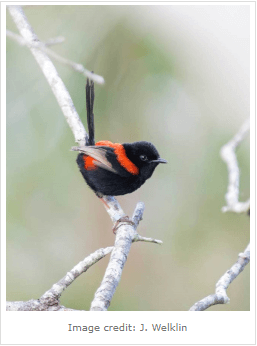
Many birds learn their songs from their parents, but what if they could get a head start? A new paper in The Auk: Ornithological Advances demonstrates that some songbirds start learning to imitate their parents before they even hatch.
Vocal learning has many benefits for birds—it lets them signal their suitability as a potential mate, recognize their relatives, and enhance their social interactions. Once Diane Colombelli-Négrel and Sonia Kleindorfer of Australia’s Flinders University, Mark Hauber of New York City’s Hunter College, and their colleagues from Cornell University discovered that Superb Fairywren nestlings learn to imitate their mothers’ calls while still in the egg, they wanted to see whether the behavior extended to other species and to learn more about its ecological context, so they turned to the related Red-backed Fairywren.
All Red-backed Fairywren females in this new study called to their eggs while incubating, and most continued to call to their nestlings for five to six days after they hatched. As a result, mother and offspring calls were more similar than would be expected by chance. Parents also put more effort into feedings nestlings with calls similar to their own. “Fairywrens have become a new model system in which to test new dimensions in the ontogeny of parent-offspring communication in vertebrates,” says Hauber.
Though the researchers had hypothesized that fairywren parents could use calls to identify alien nestlings, the result of eggs placed in their nests by parasitic cuckoos, the rate at which Red-backed Fairywren mothers called to their eggs did not increase significantly when more cuckoos were present in the habitat. Colombelli-Négrel and her colleagues speculate that the similarity of nestlings’ calls to their own could also tip parents off about which nestlings are the most vigorous and the best learners, so that they can invest more resources in the ones most likely to thrive.
The original discovery was a fortuitous accident. “Because fairywrens have high predation rates, we originally placed microphones under Superb Fairywren nests to record alarm calls against predators twenty-four seven,” says Colombelli-Négrel. “As a result, we discovered embryonic learning in Superb Fairywrens.” When they turned to Red-backed Fairywrens, they recorded vocalizations from 67 nests across four breeding seasons in Queensland, as well as playing recordings of begging nestlings to test parents’ responses.
“Prenatal vocal learning has rarely been described in any animal, with the exception of humans and Australian Superb Fairywrens,” says Dr. William Feeney of the University of Queensland, an expert on the interactions between cuckoos and host birds. “In this study, the authors present data suggesting that, like the Superb Fairywren, Red-backed Fairywrens also learn their begging calls from their mother. This result is exciting as it opens the door to investigating the taxonomic diversity of this ability, which could provide insights into why it evolves.”
Vocal imitation of mother’s calls by begging Red-backed Fairywren nestlings increases parental provisioning is available at http://www.aoucospubs.org/doi/full/10.1642/AUK-15-162.1.
About the journal: The Auk: Ornithological Advances is a peer-reviewed, international journal of ornithology that began in 1884 as the official publication of the American Ornithologists’ Union. In 2009, The Auk was honored as one of the 100 most influential journals of biology and medicine over the past 100 years.